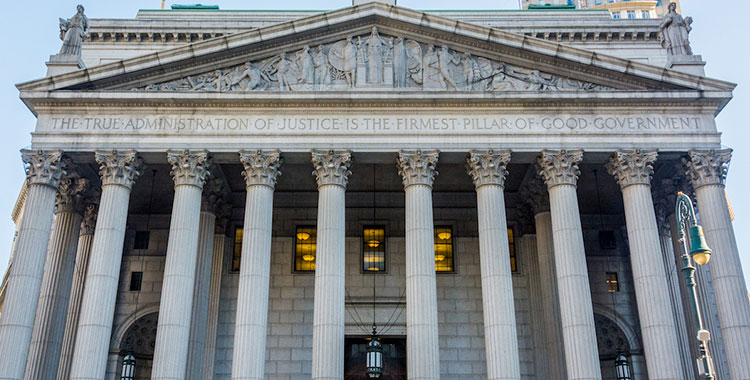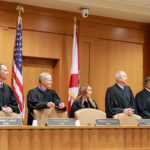Florida Federal Court Criminal Appeals and Post-Conviction Relief Motions
The criminal appellate and post-conviction process is an extremely nuanced, complicated process which is strictly regulated by an extensive body of caselaw and rules of procedure. There exists a highly disjointed patchwork of rules and cases which require extensive experience and knowledge to grasp as a cohesive framework. There are many ways in which a court can commit error subject to reversal on appeal and most of these errors may not be obvious to a normal person. The Miami appeals lawyers at Xander Law Group can assist you in determining whether an error may have occurred in your case which is subject to remedy on appeal or by post-conviction motion.
Five stages exist in criminal cases: 1) pre-trial discovery and motions; 2) resolution via trial or plea of guilty/ no contest; 3) sentencing; 4) direct appeal; 5) collateral attack using post-conviction motions. Once a defendant is convicted and sentenced there are still a myriad of options available to a defendant to reduce or reverse his or her conviction or sentence. One’s fight for freedom does not end at sentencing. In many criminal cases, the appellate and post-conviction process takes longer to resolve than the time from when a defendant is charged until he is sentenced.
Strict deadlines apply and each available remedy must be exercised in a specific order and within specific time frames or else a defendant’s right to make certain claims and assertions of error are forever waived. The nature of a defendant’s claimed error must be specifically analyzed by a competent post-conviction or appellate attorney to determine which rule of procedure permits such advancement of the argument. A common mistake of criminal defendants convicted of a crime is to focus on the facts of the claimed error and to ignore the procedural and legal nuances that are also relevant to their claim. In failing to meet a deadline or to invoke the proper rule or even subsection of a rule, a defendant may waive his claim or have it dismissed. Any subsequent attempt to bring the same factual or legal claim in a future motion will likely be denied as impermissibly successive even though the first motion was not filed properly nor adjudicated on the merits.
A defendant who proceeds to trial and is convicted is afforded more opportunities to attack his conviction and sentence than a defendant who pleads guilty or no contest. This is because a defendant who pleads guilty or no contest is not entitled to attack his conviction on direct appeal because any such appeal is waived by entry of a plea. Only alleged sentencing errors or pre-trial rulings reserved for appeal are permitted to be raised on direct appeal in such an instance. In comparison, a defendant who proceeds to trial can appeal any errors or factual findings that are preserved by objection pre-trial, at trial, or during sentencing.
Federal Criminal Appeals
Federal felony cases are tried in one of three United States District Courts in Florida and are appealed to Eleventh Circuit Court of Appeals in Atlanta. A defendant only has fourteen days from the date sentence is imposed to file a formal notice of appeal sufficiently describing the nature of the appeal and the appellate court with jurisdiction to consider the case. A filing fee is due at the time of filing. The notice of appeal is jurisdictional, which means that if the filing deadline is missed for any reason the appellate court forever loses jurisdiction to consider the defendant’s appeal. There exists an exception where a defendant informs his counsel of his desire to appeal and directs counsel to file a notice of appeal but counsel neglects to do so through no fault of the defendant. In such instances, an evidentiary hearing is required in the trial court to determine if the defendant can meet his burden of illustrating that he instructed counsel of his timely desire to appeal. If you believe that may have missed your filing deadline due to negligence of counsel please contact the attorneys at Xander Law Group promptly for an evaluation of your rights and remedies.
Criminal appeals of trial court convictions are less focused on the innocence or guilt of a defendant than they are on whether the court committed errors in admitting evidence, permitting unqualified jurors to serve, improperly dismissing qualified jurors from service, disqualifying evidence that should have been admitted, permitting improper remarks by prosecutors, permitting expert witnesses to testify who are not adequately qualified to render an expert opinion, failing to recognize qualified expert witnesses as such and improperly excluding their expert opinion, permitting the prosecution to shift the burden of proof on the accused, failing to exclude evidence which was not properly disclosed by the prosecution, improper rulings on motions, improper jury instructions and countless other legal errors recognized under the law.
A well-written appellate brief contains a concise explanation of the procedural and factual history of the case, provides an accurate recitation of the evidence and testimony from trial, cites to valid legal authority, and persuasively argues why the appellate court should rule in a party’s favor. Effective appellate advocacy is an art form which requires a unique skillset and experience which is completely different from that of trial court litigation. The attorneys at Xander Law Group possess the experience and talent necessary to provide quality representation on appeal defendants seeking to overturn their conviction or reduce their sentence.
Criminal defendants are given a unique opportunity on appeal to submit the first and final arguments on appeal. In all criminal appeals the defendant must submit an initial brief on the merits through counsel which provides the appellate court with a concise, persuasive argument as to why the trial court committed reversible error(s). The prosecution, through the United States Attorney’s Office, submits an answer brief seeking to contest the assertions of error made by the defense. The Florida Rules of Appellate Procedure permit the defendant to submit a reply brief rebutting the counterarguments of the prosecution. Reply briefs are discretionary in nature. Unfortunately, many attorneys do not routinely submit reply briefs for their clients. At Xander Law Group we always inform our clients of their right to have a reply brief submitted on their behalf and assist them in making an informed decision was to whether to waive this right. It is critical to retain counsel that will inform you of this right and involve you in the process.
Although the appellate process is almost entirely advanced by written arguments and citations to legal authority, the parties to an appeal have the right to request oral arguments before the appellate court. Oral arguments are an opportunity to appear before the panel of appellate judges and engage in advocacy of the defendant’s positions while answering critical questions posed by the judges. This is a unique opportunity to persuade judges that might have otherwise ruled against the defendant. At Xander Law Group we always advise our clients of the right to request oral arguments and advise our clients as to whether oral arguments should be requested based on the specific intricacies of their case. In almost all instances we advise our clients to request oral arguments and the Miami appeal attorneys at Xander Law Group have had a high degree of prior success in obtaining oral arguments which are not routinely granted in most cases.
28 U.S.C. § 2255 – Ineffective Assistance of Defense Counsel at Trial / Habeas Corpus Relief
The Sixth Amendment to the United States Constitution grants all people the right to counsel in a criminal prosecution. The United States Supreme Court has held that this right necessarily entitles to represented persons accused of crimes the right to effective assistance of counsel. In 1984, the United States Supreme Court decided the landmark case of Strickland v. Washington, 466 U.S. 668 (1984) holding that a criminal defendant has the right of effective assistance of counsel and establishing a test to determine if a defendant is entitled to relief from errors or omissions of counsel that depart from the minimum acceptable standard of effective representation.
The Strickland court established a two prong test to determine if a defendant is entitled to relief based on a Sixth Amendment violation predicated upon the deprivation of the effective assistance of counsel: 1) counsel’s performance fell below and objective standard of reasonableness and; 2)the deficient performance of counsel gives rise to a reasonable probability that if counsel had performed adequately the result would have been different.
The first prong of the Strickland test requires a criminal defendant to show that counsel’s actions or omissions were “deficient” to the extent that counsel’s failures were “so serious that counsel was not functioning as the ‘counsel’ guaranteed the defendant by the Sixth Amendment.”
The second prong of the Strickland test is commonly referred to as the prejudice prong because a defendant seeking to establish an ineffective assistance of counsel claim must illustrate not just that counsel’s error or omission was unreasonable, but also that this changed the outcome of the case to the defendant’s detriment. For example, if a defendant is charged with armed robbery of a convenience store and he leaves behind his photo identification and DNA evidence on a water bottle, is captured clearly on surveillance camera and is identified by a store full of patrons and workers, it would be folly to assert that counsel was ineffective for failing to investigate an alibi witness who would testify that the defendant was at home watching a movie during the commission of the robbery because there is overwhelming evidence of guilt establishing that the defendant committed the crime. In such an instance, a court would almost certainly find that the outcome of the proceedings would not have been different because any reasonable jury still would have found the defendant guilty.
Adequately meeting the Strickland standard is extremely difficult because courts give deference to counsel’s actions if they were strategically motivated or the result of a reasoned judgement call. Meeting the Strickland standard requires meeting both prongs to succeed, both independent and collectively. Experience and a detailed understanding of the law are necessary to craft a viable ineffective assistance of counsel claim that will not be denied on its face as legally insufficient.
Once an ineffective assistance of counsel claim is filed in the trial court, the judge must make a determination if the motion is facially sufficient. There are a number of ways that a motion can be stricken or denied without any further action because it does not meet applicable legal standards. If a motion is deemed facially sufficient and not plainly refuted by the record, then the trial court will often require the prosecution to file a written response. The written response by the prosecution will attempt to find legal deficiencies in the motion or to attack the veracity of the claims on the merits. Some common legal deficiencies are claims that are prohibited because they should have been raised on direct appeal, claims that were already denied on direct appeal, motions filed outside of the applicable deadline, failure of the defendant to swear to the motion under penalty of perjury, and claims that have been raised before and denied already. Attacks on the merits seek to use the law and prior events or statements made in the case to show why the defendant is not entitled to relief.
This is a critical juncture in the post-conviction process because a good post-conviction lawyer will attempt to negotiate with the prosecution to reach an agreement for a reduced sentence. The attorneys at Xander Law Group have resolved more post-conviction motions by negotiating with prosecutors than by asking for a ruling from the court. This is critical because a defendant who is incarcerated and does not retain counsel does not have the opportunity to negotiate with a prosecutor.
The defense is permitted to file a written reply once the prosecution files a response to the defendant’s motion for post-conviction relief. This is a critical function because the law affords a defendant the last word. A seasoned post-conviction attorney will review the state’s arguments with his or her client and formulate a rebuttal to the prosecution’s arguments. At Xander Law Group we pride ourselves on always involving our clients in this process.
At the conclusion of the submission of all written arguments the court makes a determination as to whether the defendant is entitled to an evidentiary hearing. This is a hearing in which the defense and prosecution are entitled to call witnesses and submit evidence in support of their positions. Often times, if an evidentiary hearing is ordered the defense is in an excellent position to have meaningful negotiations with the prosecution for a reduced sentence by way of agreement. The law requires that an evidentiary hearing be conducted if the defendant submits a facially sufficient motion which is not refuted by the record and which presents a claim that may entitle the defendant to relief if he can prove his claims. With some limited exceptions, the relief granted by the court if a defendant wins an evidentiary hearing is to vacate the conviction. This essentially places the position in the same place he was immediately after the original arrest and the state will either have to offer a plea bargain or prove their case again at trial. If significant time has passed it may be difficult for the prosecution to meet their burden at a second trial.
Post-conviction relief is also available to defendants who pled guilty or no contest. These claims are limited and require a defendant to prove several more factors than if they had proceeded to trial. The experienced post-conviction attorneys at Xander Law Group can consult with you to determine if these factors can be met in your case.
Perhaps the single most important aspect to post-conviction practice is the timely preservation and submission of claims. There is a statutory jurisdictional deadline that applies to § 2255 motions for post-conviction relief. The applicable deadline is one year from when the defendant’s conviction becomes final. A conviction becomes final when his or her appeal is denied and the time for filing for certiorari relief to the United States Supreme Court ends or, if no appeal is taken, when the time for filing an appeal ends. It does not matter how compelling of a claim a defendant has if he does not file within the deadline because a court has no authority under the law to hear a claim that is time barred.
Certain exceptions apply. For example, if an attorney is retained for post-conviction purposes prior to the expiration of the filing deadline and the attorney misses the deadline the client may still be able to file their claims upon successfully illustrating that the only reason for missing the deadline was counsel’s negligence.
Contact the Florida post-conviction attorneys at Xander Law Group for a free consultation to see if we can you assist in obtaining post-conviction relief.
Sample of Grounds Leading to Legally Recognized Claims for Ineffective Assistance of Counsel
- Counsel failed to call a favorable witness at trial
- Counsel failed to investigate a potential witness
- Counsel failed to request favorable jury instructions
- Counsel failed to object to unfavorable jury instructions
- Counsel misadvised as to the maximum penalty
- Counsel failed to convey a plea offer
- Counsel failed to file a motion to suppress evidence or statements
- Counsel failed to depose witnesses
- Counsel failed to advise of immigration/ deportation consequences
- Counsel failed to investigate mitigating evidence for trial
- Counsel failed to investigate mitigating evidence for sentencing
- Counsel had a conflict of interest
- Counsel failed to object to erroneous sentencing score sheet
- Counsel misadvised or failed to inform regarding a waiver of rights
- Counsel failed to advise that if a defendant chooses to testify the prosecution may introduce prior criminal convictions
- Counsel failed to advise of applicable minimum mandatory sentences
- Counsel failed to investigate an alibi defense
- Counsel failed to preserve evidence
- Counsel failed to inspect physical evidence, such as weight of drugs in a narcotics case
- Counsel failed to research impeachment material for adverse witnesses
- Counsel failed to object to adverse expert witness testimony
- Counsel failed to obtain expert witnesses
- Counsel failed to file a stand your ground self-defense motion
- Counsel invited error
- Counsel failed to preserve appellate review with appropriate objections
- Counsel failed to object to improper burden shifting
- Counsel failed to object to improper statements by the prosecution during opening statements
- Counsel failed to object to improper statements by the prosecution during closing arguments
- Counsel failed to object to juror misconduct
- Counsel failed to object to improper dismissal of jurors
- Counsel failed to object to prosecution’s failure to establish venue and jurisdiction
- Counsel failed to object to expired statute of limitations
- Counsel failed to object to unconstitutional statute or rule
Appeals from Denial of Ineffective Assistance of Counsel Claims
United States District Courts have two options when denying a motion for post-conviction relief: 1) a denial based on the face of the record or for failure to state a claim the law recognizes without the need of conducting an evidentiary hearing; or 2) a denial after having considered evidence and testimony at an evidentiary hearing.
The law requires a judge to hold an evidentiary hearing when a post-conviction claim is not refuted by the record and which may be substantiated with available witness testimony or through the introduction of evidence. One of the most common failures in the criminal justice system is the failure of judges to hold evidentiary hearings when necessary. Fortunately, the appellate courts have a review process for when a claim is improperly denied without an evidentiary hearing. This process is not automatic and must be initiated by the defendant.
In cases in which an evidentiary hearing was conducted and the defendant’s motion was denied after the court considered evidence and testimony, the defendant can appeal the court’s determinations of fact and conclusions of law. This process must be initiated with a notice of appeal timely filed to the Circuit Court of Appeals. The proceedings are essentially identical to those in a direct appeal, except that the subject matter of the proceedings is confined to the court’s ruling on the defendant’s post-conviction motion.
The post-conviction attorneys at Xander Law Group have extensive experience in representing clients on appeal from post-conviction denials by the trial court. Please contact us for a free consultation if you are seeking representation regarding appealing the denial of a federal post-conviction motion in a criminal case.













